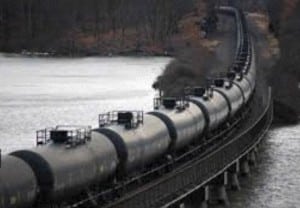Following angry reaction to oil ships, feds seek feedback on trains
Three weeks after the Coast Guard closed public comment on a proposal to add 10 anchorage sites for oil barges on the Hudson River, including a site between Beacon and Newburgh, the U.S. Department of Transportation is asking for feedback on proposed restrictions on trains that carry oil along its shore.
The comment period was scheduled to open Friday, Dec. 30 and continue through Feb. 28.
New York has pushed for stricter regulation of the oil trains, often derided as “bomb trains” because of their potential explosive power. In neighboring Quebec, a 2013 oil-train accident triggered an explosion and fire, killing 47 people and destroying part of a village.
Working through its Pipeline and Hazardous Materials Safety Administration, DOT wants public input as it considers whether to establish limits on the vapor pressure of hazardous fuel shipped by rail. Higher vapor pressures contribute to crude oil’s volatility and flammability.

DOT published its notice in November, nearly a year after New York Attorney General Eric Schneiderman petitioned the agency to limit vapor pressure to less than 9 pounds per square inch (PSI). The agency’s announcement specifically referred to Schneiderman’s request but asks only for reaction to setting “a range of vapor pressure thresholds,” not just below 9.
According to the Attorney General’s Office, some types of oil, such as the crude from the Bakken Shale formations in North Dakota, have the highest vapor pressures and thus pose a greater threat than other fuels. It noted the Quebec accident involved a train carrying oil with a PSI above 9.
In a statement, Schneiderman said he welcomed the DOT initiative, calling it “a long-overdue first step towards reducing the danger to residents in harm’s way of oil trains in New York and across the country.”
Hayley Carlock, director of environmental advocacy for Scenic Hudson, said the Poughkeepsie-based organization intends to submit comments. “We believe it is certainly a step in the right direction to adopt such limits, but remains to be seen how stringent the ultimate rule will be,” she said.
In his petition to DOT, filed in December 2015, Schneiderman pointed out that no national limit on vapor pressure exists for train shipments. Two years ago, after the New York State departments of transportation and environmental conservation raised concerns about bomb-train hazards, North Dakota mandated that oil producers make Bakken crude safer before shipment by keeping vapor pressure to 13.7 PSI or less.
The docket number for the proposed rulemaking is PHMSA-2016-0077, and the petition will be available at regulations.gov.

Are they asking us to “pick our poison?” We should pass on the choice.
They say a picture is worth a thousand words. Well, take a good look at the photo to see how many oil rail cars are being pulled by just this one train. In a very informative meeting at Garrison School last year hosted by Riverkeeper, it was clearly pointed out that many rail bridges are badly rusted and that the structural security of many rail cars is equal to those that carry oranges. Before we are asked to review these types of glaring industrial safety issues, these issues should be addressed first.
No trains or barges is what we want.
This is a good opportunity for all of us to make our voices heard regarding the significant dangers posed by transportation of Bakken crude by rail along the Hudson. Our lives, our land, and our precious Hudson River ecosystem are at risk. Please comment, and indicate your support of regulations mandating that vapor pressure in tanker cars carrying oil be required to be 9 PSI or less, in accordance with Attorney General Schneiderman’s petition. The website is regulations.gov and the docket number is PHMSA-2016-077.
If the “Bakkan” (sounds like some ferocious space ship in Star Trek — oh, wait, it is) oil is so great, let them burn it in North Dakota. Build more windmills here.
To be blunt, it’s not so much that one disagrees that high-density energy sources, in safe quantities, safely delivered, are not necessary for our “civilization” to continue to exist, it’s just that no sane, informed person today believes the federal government will “do the right thing” in protecting the public at large from accidents and carelessness caused by the various large corporations involved – corporations whose sole interests are to maximize their profits while minimizing their costs and their risks, and avoiding, while passing onto the public at large, their responsibilities. As a consequence of the new (but not the improved) distribution of power in North America today, profits are privatized while losses, and the death and destruction stemming from avoidable “accidents,” those of the past as well as those to come, are socialized (i.e., paid for by everyone else – but mostly by the weakest and by least informed among us).
The nominees for the federal cabinet positions by the next presidential administration, if anything, indicate an even greater disinclination to meet their implied duties and mandate to protect the public from corporate recklessness and disingenuousness. The corporations are merging with the state, and the state is merging with the corporations. There is a word for that.
I am very concerned about the significant dangers posed by transportation of Bakken crude by rail along the Hudson. The Hudson River ecosystem that has made so much restorative headway is at risk from both train and barge transportation of crude. It seems pointless to move backward in our efforts to protect and preserve our beloved Hudson River Valley and I do not believe that support of the oil industry is in any way worthy of these dangerous and self-serving potential permissions.